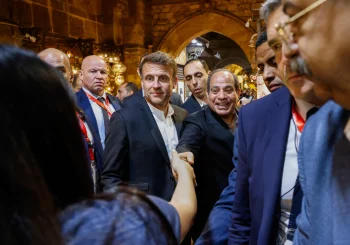The war on Palestine has long been a source of contention and complexity, and its reverberations are felt far beyond the borders of the Middle East.
In Europe, the conflict has sparked divisions and triggered a range of responses, particularly within the far-right movements.
Europe’s Divided Leadership: Historical Guilt and Shifting Consensus
The European Union’s response to the war on Gaza has been characterized by a divided leadership, as some member countries align themselves with Palestine while others with Israel.
Due to Europe’s historical connections with the Holocaust and antisemitism, there are reverberating sensitivities surrounding Israel, leading to initial internal divisions and backlash within the EU against visits to Israel by its leaders. These divisions were further highlighted during the UN General Assembly votes, which showcased differing stances among EU member states.
This revealed a divide in consensus on the war on Palestine, with governments aligning themselves more closely with Israel’s viewpoint. However, it is important to note that public opinion, particularly among younger generations and specifically in Scotland, leans towards the Palestinian cause, creating a divergence between the populace and their governments.
Islamophobia and Anti-Muslim Sentiment: Exploiting Divisions
The war on Palestine is believed by some to have had a significant impact on far-right populism in Europe, potentially contributing to the growth of Islamophobia.
However, it is important to note that establishing a direct link between the war and the rise of Islamophobia is challenging.
While there has been a noticeable increase in Islamophobic attacks across the continent, attributing them solely to the war would require more substantial evidence.
This atmosphere of Islamophobia is not limited to the specific context of the war on Palestine but extends to broader sentiments against Muslims in European societies.
Traditionally known for their anti-Semitic rhetoric, far-right populist groups have seized the opportunity to redirect their focus towards attacking Muslims, thus capitalizing on the complexities of the conflict.
Prominent figures such as Geert Wilders, Member of the House of Representatives of the Netherlands, has employed anti-Muslim policies to bolster his political base, heightening tensions within European societies.
Consequences for Europe: Divisions, Minority Populations, and Global Messaging
The divisions within the European Union over the war on Palestinie not only challenge the EU’s internal cohesion, but also impact its credibility on the global stage, particularly when compared to its stance on other conflicts.
The EU’s struggle to present a unified front raises questions about its effectiveness as a diplomatic actor and its ability to exert influence in the region.
Moreover, the war on Palestine and the far right’s response to it have fueled tensions within European societies, affecting minority populations with an increase in Islamophobic attacks and raising concerns about the rise of extremism and hate crimes.
The internal discord within the European Union over the war on Palestine can have repercussions on the EU’s actions concerning other international issues, including the situation in Ukraine.
The divisions among member states regarding the war on Gaza may diminish the EU’s credibility and coherence in addressing and responding to other global challenges, potentially undermining its ability to effectively navigate those situations.
Europe’s Limited Capacity for Influence: Verbal Expressions vs. Substantial Actions
European Council President Charles Michel’s recent restatement of Europe’s position on the war on Palestine emphasizes Israel’s right to self-defense within the bounds of international law. While Europe expresses a willingness to play a role through diplomacy and foreign policy instruments, its actual capacity to influence peace in the region remains limited.
Internal divisions within Europe, skepticism about proposals like an “international peace conference,” and the complexity of the conflict itself all contribute to the challenges faced by the EU in making a substantive impact.
At present, Europe’s engagement with the war on Palestine primarily involves verbal expressions of solidarity rather than substantial actions.
The far-right movements in Germany and other European countries have responded to the war on Palestine by attempting to cut funds for Palestinians, adding another layer of complexity to an already twisted situation.
However, several European countries have taken steps to cut off or stall arms exports to Israel due to its attacks against Palestine.
For example, the Netherlands was instructed by its court to halt the export of F-35 fighter jet parts to Israel, citing the risk of serious violations of international law.
Italy, Spain, and Belgium have also announced the suspension and halt of arms sales or exports to Israel since the war began.
Europe’s divided leadership, the rise of Islamophobia, and the struggle for cohesion within the European Union have shaped the far right’s interpretation of the conflict.
While Europe expresses verbal solidarity and a willingness to play a role, its influence remains limited.
As the war on Palestine continues, Europe faces the task of navigating internal divisions, fostering inclusivity, and promoting a unified, constructive approach to the conflict.





Comment (1)
[…] Read More […]